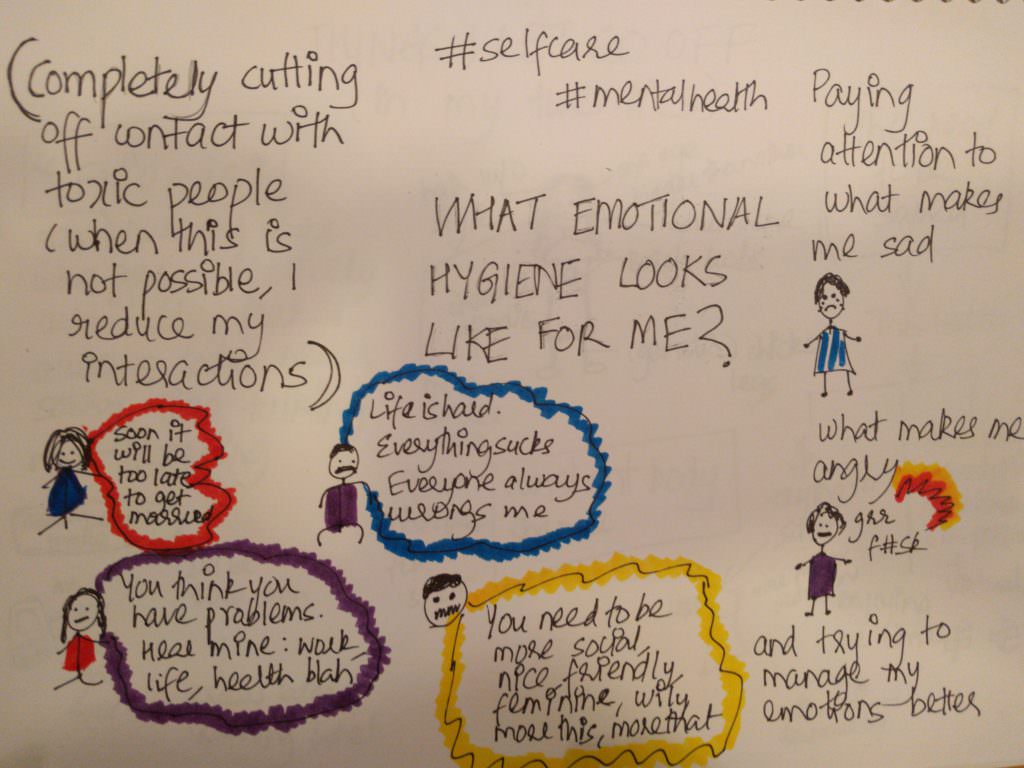Do you brush your teeth regularly? Do you shower (occasionally, if not always)? Do you throw out garbage, clean your closet, straighten out things laying about?
If your answer to any of these questions is a yes (even if it is a half-hearted yes :)), you make an attempt to practice hygiene in some parts of your life. What if I asked you about what do you do for your emotional hygiene, what would you say?
Emotional self-care (and most self-care) is often confused with self-indulgence. So let’s take a minute to talk about what is emotional hygiene/self-care: it involves being aware of our psychological health, understanding what affects it positively or negatively, adopting habits that help build healthy emotions and psychological well-being. ‘Resilience’ is the word that comes to mind — all of us are going to experience sadness, grief, loss, failure, setbacks, possibly trauma and more at some point in our lifetime. Emotional resilience equips us to learn to deal with life’s expected and unexpected stressors. Surprisingly, it is not a skill many of us are taught as children or even learn as adults.
If you are still not convinced, think about it this way: if you had a wound that was bleeding, would you consider leaving it open as the best way for it to heal? If you are tempted to respond by saying that physical wounds are not similar to emotional setbacks, think for another minute – our bodies do not work independently of our mind and vice-versa. We know that severe emotions can adversely impact our physical health and ability to function.
Also Read: 5 Mental Illness Myths We Must Do Away With
Let’s talk about some ways to practice emotional hygiene -this is not a comprehensive list, there is no comprehensive list except for what you decide for yourself.
- Notice how your emotions impact your body
Think about how different emotions feel in your body — for me, anxiety feels like a ball of lead in my chest, anger radiates all over, anxiety leaves me listless but anger will often exhaust me. Think about all the emotions you have felt in the last two weeks: where were you, how did it make you feel in the moment, how did you feel afterwards? Think about when you were last laughing or had a meaningful conversation and how that felt. Connect the dots — anxiety will kill my appetite but it takes me a few days to realize that and by then, I am weak and more susceptible to a downward thought and physical spiral. I am learning that tiredness is not always an automatic outcome, days full of minor or major conflicts make it worse.
2. Break negative/ruminating thought patterns
This is far, far easier said than done, especially if you already deal with self-esteem issues and struggle to see the good in yourself. Start with reminding yourself that thoughts are not the same as facts, they are not! Negative thought patterns or rumination do not go away in a day, and perhaps they can never go away completely. What’s important is to first identify the pattern or at the very least consider the idea that there is a pattern to the negative chatter in your head. I realized that whenever I had an interesting professional opportunity, I started by thinking I was not good enough and I would likely fail at it — some version of self-sabotage and reassurance. Several years later, I have learnt to let the thought come into my mind, float there for a while and then let it sit there or disappear, while I do what I want to do — I find this technique helpful for several things I ruminate over. Not everything works like that nor will what works for me, work for you. You have to pause to identify what negative patterns of thinking affect your emotional health and how you can start to break those.
3. Identify the sources of toxicity in your life and reduce or eliminate them
This is a tough one. It seems pretty obvious, duh! But often the sources of toxicity in our life are things or people we cannot change or distance ourselves from easily. Sometimes it is a berating, critical boss at a job we cannot leave (just yet). At others, it is co-dependent parents who refuse to let go of adult children or siblings whose behaviours affect our health or well-being. It can also be some of our friends, whose company leaves us demotivated and questioning our life choices or who are emotionally taxing and only want to share their problems. This is not a laundry list, you have to pinpoint the source of toxicity in your life and its cost to your emotional health for yourself. For me, it is easier to completely cut off from people who I find toxic rather than limit my interactions. I recognize there is a trade-off, a loss in my choice but I have learnt I would much rather live with this loss rather than interacting with people who affect my emotional health adversely.
If you have ways in which you practice emotional self-care, especially in the context of living in a society that often values individual needs and preferences less than group needs, we would love to hear from you. In my own life, I have noticed setting boundaries with my family when I lived at home had been hard — there were emotional negotiations around activities such as visiting relatives or acceptable conversations on certain topics. It took an invisible but significant toll on my emotional health and it hasn’t been easy to identify it and more so, building solid boundaries.
We hope to hear from you about your experiences!
About the author(s)
Feminist and Indian. Interests include gender, education, mental health and wellness. India/US.




